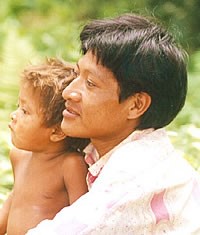Guarani, Mbya in Argentina

Photo Source:
Richard Perik
|
Send Joshua Project a map of this people group.
|
| People Name: | Guarani, Mbya |
| Country: | Argentina |
| 10/40 Window: | No |
| Population: | 11,000 |
| World Population: | 46,300 |
| Primary Language: | Guarani, Mbya |
| Primary Religion: | Christianity |
| Christian Adherents: | 80.00 % |
| Evangelicals: | 2.25 % |
| Scripture: | Complete Bible |
| Ministry Resources: | Yes |
| Jesus Film: | Yes |
| Audio Recordings: | Yes |
| People Cluster: | Guarani |
| Affinity Bloc: | Latin-Caribbean Americans |
| Progress Level: |
|
Introduction / History
The Mbya are a subgroup of the greater Guarani groups. They live in Brazil, Argentina and Paraguay.
Mbya means "us" or "our people." Not surprisingly, other Guarani subgroup names have similar meaning. Their subgroup is also defined by their Mbya dialect.
What Are Their Lives Like?
The Mbya Guarani live in villages made up of five or six family units. They value both the nuclear and extended family.
Music and dance are very important in Mbya Guarani culture. Music and dance are used to celebrate a harvest. Some music has religious significance. At other times music and dance are for recreation; it bonds them together as a community.
What Are Their Beliefs?
Of the three countries where the Mbya Guarani people live, they are by far least reached with the gospel in Paraguay.
The Mbya community maintains a house of prayer and collective rituals. Shamanism has a spiritual hold on the Mbya Guarani community. The shamans deal with spiritual issues, but they are more likely to address health issues. They offer herbal remedies for sickness. Shamans are finding it increasingly difficult to find the right herbs in today's environment. Shamans can be either men or women.
What Are Their Needs?
The Mbya Guarani need to put all their hope and faith in the person, Jesus Christ.
Prayer Points
Pray for Mbya Guarani disciples to make more disciples.
Pray for the Lord to bless them abundantly so that they will know that only he is worthy of praise and worship.
Pray for their identity to be put in the work of Christ on the cross.